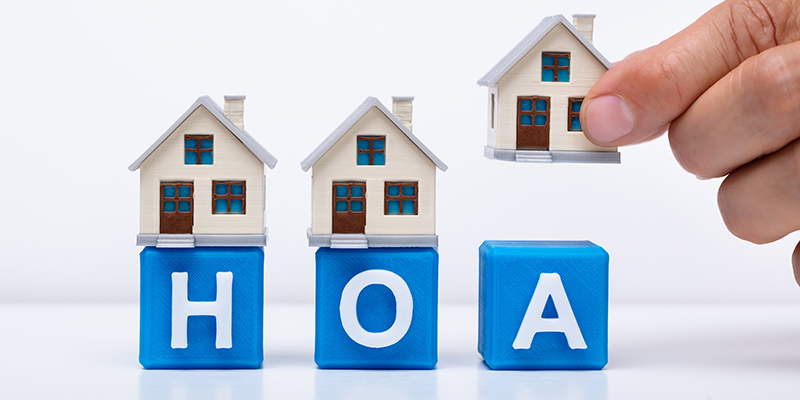Many people have probably heard about homeowners associations. But, what is an HOA anyway? And what does it mean to live in a community managed by one?
What Is an HOA? HOA Meaning Explained
In the process of searching for a new home, you might come across properties listed as belonging to an HOA. But, what does HOA mean?
HOA is short for homeowners association. A homeowners association is an entity tasked with the management and maintenance of a planned community. These associations come in many forms, including single-family homes, townhomes, and condos. When a home is part of an HOA, buying it means automatically becoming a member of that association.
What Is the Purpose of an HOA?
So your home is part of a homeowners association — will anything change? What is the point of an HOA exactly?
The primary function of an HOA is to maintain the community and preserve property values. There are many moving parts when it comes to community management, and there is typically a set of HOA board members calling the shots. These board members, while unpaid volunteers, are elected into position by a vote from the membership.
The HOA board ensures the community remains in good condition by performing several duties, including but not limited to:
- Planning the budget to ensure the association has enough money to cover the coming year’s expenses;
- Maintaining the association’s reserve fund;
 collecting dues and assessments;
collecting dues and assessments;- Overseeing maintenance and repairs of common areas;
- Hiring and coordinating with vendors;
- Communicating with homeowners, including sending out notices and meeting agendas;
- Enforcing the rules and covenants of the community;
- Ensuring compliance with the law and the association’s governing documents; and,
- Hiring and coordinating with the HOA management company.
The Pros and Cons of Association Living
What does it mean to live in an HOA? As with a lot of things, living in an HOA community comes with pros and cons. Before you buy a home managed by an HOA, make sure to consider both sides of the coin. This way, you don’t end up stuck in a situation of your disliking.
What Are the Advantages of a Homeowners Association?
First of all, homeowners who live in an HOA community obtain access to its common amenities and facilities. While these amenities can vary from one association to another, usual amenities include swimming pools, clubhouses, and fitness centers. There are also HOAs that have their own parks, tennis courts, and golf courses. Additionally, more often than not, these amenities are only available for member use.
Another benefit of homeowners association living is that homeowners get all sorts of convenient services. This can range from snow removal and trash disposal to landscaping. Homeowners also don’t need to worry about keeping the neighborhood clean and well-maintained, as HOAs are tasked with this very job. As such, most HOA communities boast excellent curb appeal and high property values.
Finally, nothing compares to the sense of community that living in an HOA can offer. Because HOAs typically organize social events, you get a chance to meet your neighbors in a social setting and get to know them. In comparison, when you live outside of an HOA, you probably won’t even know who your neighbors are.
What Are the Disadvantages of an HOA?
Of course, homeowners associations also pose their fair share of disadvantages. One of the main downsides of HOA living is that you don’t get a lot of control when it comes to property use and modification. Many associations limit what you can do with your home, particularly when it comes to external changes such as paint color, building a shed, and how tall your fences should be. There are also several other rules to follow, such as noise rules or quiet hours, parking rules, and pet policies.
It is worth noting, though, that these rules do serve a purpose. They exist to maintain order in the community and preserve its overall appeal. Without these rules, a neighborhood can quickly become chaotic — with untrimmed hedges, cars parked everywhere, and mismatched house colors.
Having to pay HOA dues is another commonly cited disadvantage of homeowners association living. But, as with rules, dues play an important role in the association’s operations.
Can You Refuse to Join a Homeowners Association?
Generally speaking, you can’t refuse to join a homeowners association. For a large majority of HOAs, membership is automatic and mandatory once you buy a home in the community. Membership, though, shouldn’t come as a surprise. Your real estate agent and seller should inform you prior to closing that the home belongs in an HOA. Additionally, they should provide you with a copy of the association’s governing documents and financials. This way, you can gauge whether or not joining that particular HOA is a good decision for you.
What Are HOA Fees?
Living in an HOA community also means having to pay a homeowners association fee. What is an HOA fee? Paid either monthly or annual, these recurring dues go toward the association’s operating fund to pay for the various expenses of the community. After all, maintaining an HOA doesn’t come free. Moreover, a portion of these dues also goes to the HOA’s reserve fund, which is used to pay for major replacements and repairs in the future.
What do HOA fees cover? It depends on the expenses of your community. Common examples of HOA expenses include:
- Insurance premiums
- HOA management fees
- Maintenance and repair costs
- Landscaping fees
- Common utilities
Everyone in the community, even members of the HOA board, must pay HOA dues.
Raising Fees: Is It Allowed?
Do HOA fees go up? In a word, yes. Homeowners association fees don’t remain the same forever. Dues are calculated based on the budget for the year’s expenses. When expenses go up, so do HOA fees.
There are many factors that can affect an association’s budget and fees. These include the rising cost of goods (i.e. inflation), increased wages, new common areas, and renovations. Additionally, if your HOA is trying to reach its appropriate reserve fund level, it may call for larger reserve contributions.
Bear in mind, though, that there are protections in place to keep HOAs from increasing dues too much. An HOA’s governing documents could impose a limit on increases. Similarly, some states have enacted laws that prevent associations from raising dues to a certain point. Arizona law, for instance, says that HOAs can’t raise dues by more than 20% per year without obtaining majority approval from its members.
What Are the Typical HOA Rules?
As briefly discussed in a previous section, homeowners associations usually have rules in place to maintain order in the community. While these rules can vary from association to association, typical HOA rules include:
- Exterior paint rules
 Architectural rules
Architectural rules- Lawn maintenance rules
- Pet restrictions
- Parking rules
- Vehicle restrictions
- Noise rules
- Guest rules
- Holiday decoration restrictions
- Rental restrictions
Can an HOA Evict a Homeowner?
The short answer is yes. When a homeowner defaults on their dues payments, an HOA has several options available. Most start with a stern notice informing the owner of their delinquency. Many associations also impose a fine for the late payment. If an owner still fails to settle their unpaid dues, HOAs will place a lien on the property, at which point they can choose to initiate foreclosure proceedings.
Your Questions Answered
Living in a homeowners association can definitely be confusing. But, what’s even more confusing is when you get behind the wheel. Managing an HOA community is not as easy as it seems, as evidenced by the many duties board members must fulfill.
If your HOA board needs help, perhaps it’s time to automate your processes and invest in an HOA management software. Call Condo Manager today at (800) 626-1267 or contact us online for a free demo.
RELATED ARTICLES:
- How To Read HOA Financial Statements And Understand Them
- HOA Architectural Requests: Keeping Track Of Them With An HOA Management Software
- 7 Consequences Of Delinquent HOA Dues



